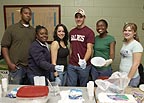December 20, 2005
Research may aid dairy farmers, consumers
CARBONDALE, Ill. -- Could cheese cut your cancer risk? Could ice cream increase your chances of avoiding inflammatory disease? Could milk build a better brain? And could they do these things while saving the family dairy farm?Amer AbuGhazaleh, an animal scientist at Southern Illinois University Carbondale, is spending the next three years trying to find out, with a $125,000 grant from the Illinois Council on Food and Agricultural Research paying for the work.
Based on his previous research in South Dakota, AbuGhazaleh believes that simple dietary changes could produce substantial amounts of two types of fatty acids known to protect against heart disease, cancer and diabetes, among other ailments. One type, conjugated linoleic acid (CLA for short), comes from bacteria active in the rumen, the first compartment of a cow's stomach. The second, omega-3 fatty acids, comes from fish oil and flaxseed oil.
Although cows produce small amounts of CLA on their own, it's not enough to give their milk that extra health punch. So the first dietary change AbuGhazaleh made with his SIUC Holsteins was to turn the cows out to pasture rather than keeping them in barns.
"Grazing has been shown to increase the concentration of this fatty acid fourfold — we don't know why," AbuGhazaleh said.
He's also feeding the cows a mix of corn, soybean meal, vitamins and minerals laced with a little fish oil and flaxseed oil.
"Not only does the linseed oil have omega-3 fatty acids, but it also acts as a precursor for the CLA, providing a substrate (material for the stomach bacteria to go to work on)," AbuGhazaleh said.
In South Dakota, where he worked with cows in confinement operations, AbuGhazaleh found he could increase by three to four times the amount of CLA and omega-3 fatty acids in their milk when he added the two oils to their diet. Because of the added boost grazing provides, he thinks the amounts will shoot up even more dramatically in this study.
"We expect combining grazing with supplements to cause up to an eight- to tenfold increase," he said.
While many small dairy farms already have turned to grazing as a cost-cutting measure, they are finding that even lower feed costs don't offset low prices for raw milk. If consumers saw that milk as healthier or more nutritious, however, they might be willing to pay more for it.
"Consumers are currently paying more than three times the price of regular eggs for omega-3 enriched eggs," AbuGhazaleh said.
"Marketing CLA and omega-3 enriched dairy products at such a premium would potentially triple revenues."
Most of that income could stay on the farm if farmers take advantage of newly available processing equipment, downsized to fit the needs of the smaller producer, to make cheese, ice cream and pasteurized milk right at the dairy.
To show it could be done, AbuGhazaleh spent a little less than $500 on equipment that allowed him to churn out those enriched dairy products in his lab.
"It was very easy to use — the instructions are clearly written," he said.
He served up his first samples in late October to students, faculty members and passers-by in the SIUC Agriculture Building, along with a customer satisfaction survey designed to test their marketability. He expects to have their responses analyzed by the first of the year.
Leading in research, scholarly and creative activities is among the goals of Southern at 150: Building Excellence Through Commitment, the blueprint the University is following as it approaches its 150th anniversary in 2019.
(Caption: Try it! — Students at Southern Illinois University Carbondale offer passersby a taste of ice cream, cheese and milk with a secret ingredient. SIUC animal scientist Amer AbuGhazaleh is feeding his dairy cows a supplement that contains fish oil and linseed oil to see if they will produce healthier milk. If results pan out, dairy farmers could command higher prices.)
(Pictured are (from left) first-year graduate students William Brown of Fayetteville, N.C., and Gwenetta D. Flowers of New Bern, N.C.; junior Jaclyn M. Hollander of Buffalo Grove; sophomore Justin F. G. Garleb of Valmeyer; first-year graduate student Deidra O. Felton of Morehead City, N.C.; and freshman JoAnn T. Morgando of Carterville. All but Morgando, who is a biology major, are studying animal science, food and nutrition. )

